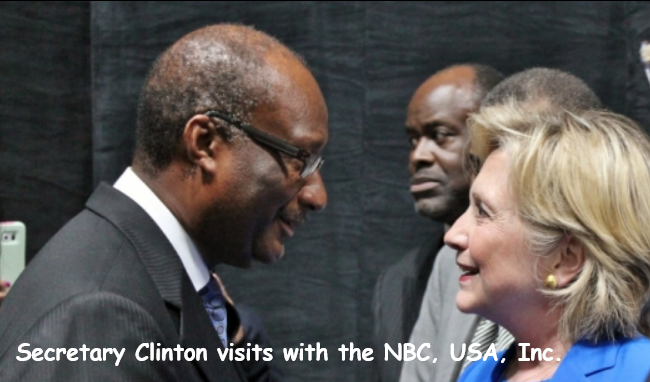Democratic presidential candidate Hillary Clinton set aside her “Midwestern Methodist” reluctance to wear her religion on her sleeve, and preached to the choir in a message peppered with Bible verses and personal experiences in African-American churches in an address Sept. 8 to the National Baptist Convention, USA, Inc.
“I happen to be a born-and-raised Methodist, but I’ve been married to a Southern Baptist for more than 40 years,” the former first lady, U.S. Senator and Secretary of State, told delegates at the group’s weeklong annual session in Kansas City, Mo. “From Arkansas to New York, across this great country, you have welcomed me into your congregations with open arms and open hearts.”
“I am sure some of you are sick and tired of politicians who think they can just show up at election time, say a few nice words and then earn your support,” the Democratic nominee said. “You and your congregations deserve better than that.”
Clinton said people “who look at the African-American community and see only poverty, crime and despair are missing so much” such as the vibrancy of black-owned business and the bedrock role of the African-American church.
“Our nation’s values are being questioned in this election,” Clinton said, turning attention to opponent Donald Trump. “We are facing a candidate with a long history of racial discrimination in his business, who traffics in toxic conspiracy theories like the lie that president Obama is not a true American. He doesn’t even respect all Americans. How can he serve all Americans?”
“We must keep calling him out and rejecting the hateful, bigoted rhetoric that seeks to pit Americans one against each other and continue making the case in every way for our vision of an America that is stronger together, an America where all our children have a choice to live up to their God-given potential no matter where they come from or what they look like, what the circumstances of their lives have been,” she said.
Toward the end of her 30-minute speech, Clinton set aside politics for “something that doesn’t always come naturally to a Midwestern Methodist.”
“That is to talk about my own faith,” she said. “How it led me to a life of service. How it will guide me as president.”
“Sometimes people ask me ‘Are you a praying person?’ and I tell them if I wasn’t one before, one week living in the White House or on the campaign trail would have turned me into a praying person,” she quipped. “But I have the great blessing to be raised by a family and a church that instilled in me a deep and abiding Christian faith and practice.”
“I still remember my late father, a gruff former Navy man, on his knees praying by his bed every night. That made a big impression on me as a young girl, seeing him humble himself before God.
“My mother taught Sunday school at our church. Partly, she said, because she wanted to make sure that my brothers actually showed up at Sunday school after they walked out the door. Her faith was rooted in gratitude for the love that helped her survive a painful childhood after her own family abandoned and mistreated her. She was sustained by the kindness of others, like the first grade teacher who saw that she had nothing to eat at lunch and brought extra food to share. My mother was determined to pay that kindness forward, and she really liked the Wesleyan credo of our church, do all the good you can for all the people you can and in all the ways you can and as long as ever you can.
“I was also so blessed to have a remarkable youth minister who believed like John Wesley, the founder of Methodism, that the world is my parish. He told us – these young white kids in a suburban area of Chicago – you can’t just be satisfied to do your own church and your own middle-class life. We’re going into the inner city of Chicago. We’re going into church basements for fellowship with young people your age in African-American churches and Hispanic churches. That was the first time I was in a black church, when I was a teenager.”
When her youth minister sent teenagers home with permission slips from their parents allowing them to ride in the church van to hear a speech by Martin Luther King Jr., Clinton recalled that some of the parents wouldn’t let their kids go.
“My mother said this is a historic opportunity,” she said
“I remember hearing Dr. King preach one of those well-known sermons, ‘Staying Awake During a Revolution,’” she reminisced. “And then I stood in line with everybody in that big hall just to shake his hand and look into his eye.”
“His words, the power of his example, affected me deeply and added to the lessons of my minister to face the world as it is, not as we might want it to be, but to committing ourselves to turning it into what it should be,” Clinton said.
Clinton described the faith she inherited from her family and church as “an activist social justice faith; a roll-up-your-sleeves, get-your-hands-dirty faith.”
“I am grateful for the gift of personal salvation and the great obligation of the social gospel,” she said.

